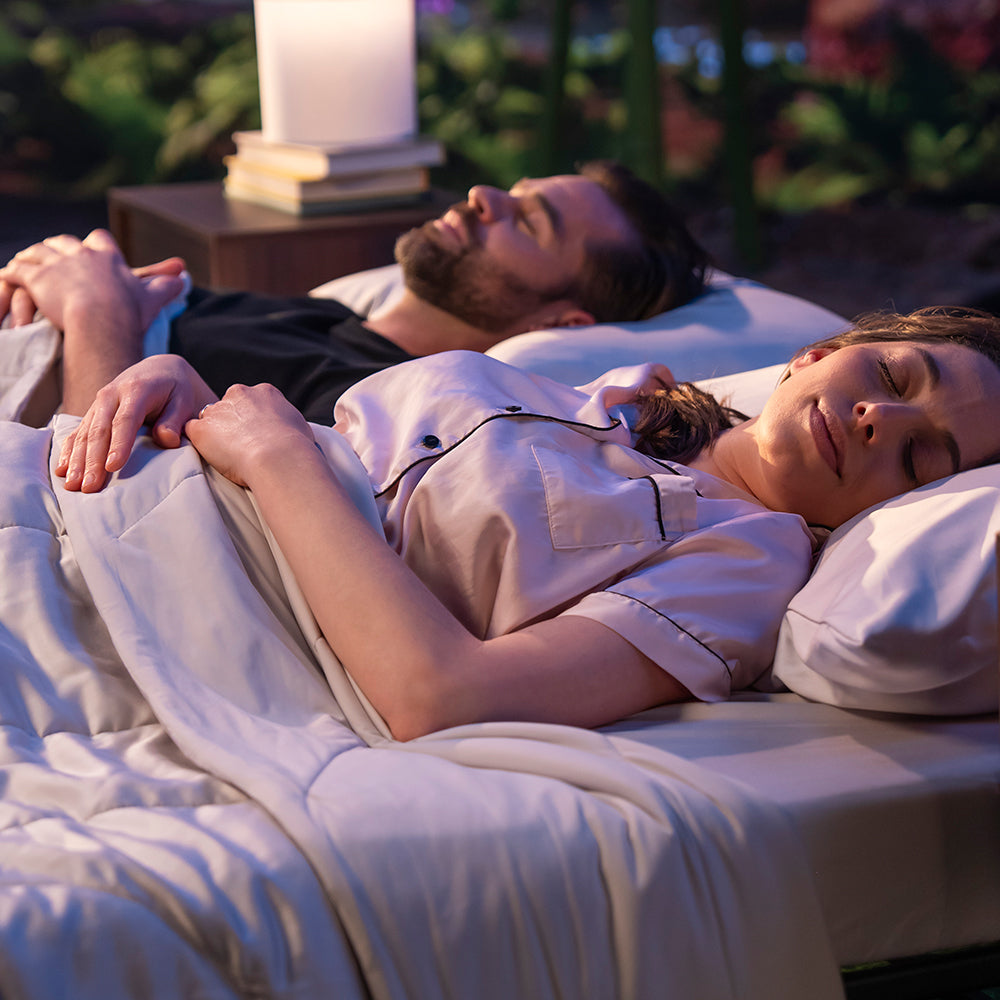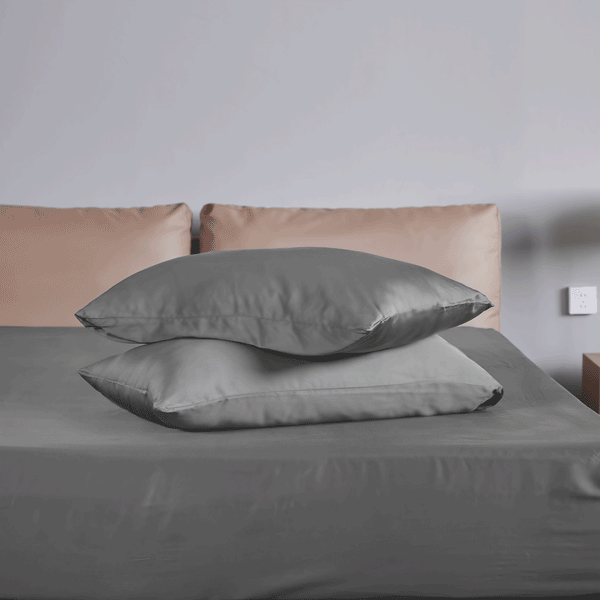Sneezing, congestion, and itchy eyes just as you're trying to fall asleep—sound familiar? You're not alone. Many people find their allergies ramp up at night, turning what should be a restful period into a battleground for comfort. This article asks, "Why are my allergies worse at night?" Understanding the triggers and adopting strategic measures can reclaim your night and ensure a more peaceful sleep.
Exploring Causes and Solutions
Several factors contribute to the worsening of allergies at night:
Bedroom Allergens
Your bedroom might be a haven for allergens like dust mites, pet dander, and mold. These unwelcome guests thrive in bedding, carpets, and humid environments, increasing allergy symptoms at night.
Evening Air Quality
Pollutants and pollen can settle in the evening, worsening air quality than during the day. If you're allergic to these particles, your symptoms might spike as night falls.
Body's Natural Rhythms
The body's circadian rhythms influence hormone levels that can affect allergy symptoms. Cortisol, a natural anti-inflammatory, dips at night, potentially exacerbating allergic reactions.
Lying Down Position
Practical Solutions for Nighttime Allergy Relief
To combat nighttime allergies effectively, consider the following strategies:
- Allergen-Proof Your Bedroom: Invest in allergen-proof mattresses and pillow covers made from natural fabric. Regularly wash bedding in hot water to kill dust mites and remove allergens.
- Air Purification: Use a high-efficiency particulate air (HEPA) purifier to clean the air in your bedroom from dust, pollen, and pet dander.
- Manage Humidity: Keep your room's humidity level between 30-50% to discourage mold growth and dust mite proliferation.
- Shower Before Bed: Rinse off pollen and other allergens from your skin and hair to prevent them from spreading to your bedding.
- Medication: Consult a healthcare provider about taking allergy medications before bedtime to help control symptoms.
Advanced Strategies for Managing Nighttime Allergies
Enhancing your approach to combat allergies at night continues beyond basic home adjustments. Delving deeper, let's explore advanced techniques to shield your nights from allergic assaults further.
Optimize Your Bedding Beyond Allergen-Proof Covers
Switch to hypoallergenic materials not just for covers but also for pillows, comforters, and even your mattress. These materials are designed to naturally resist common allergens. Also, consider the benefits of wool or silk over synthetic fibers, as they're less likely to harbor dust mites.
Consider the Role of Indoor Plants
While plants can enhance indoor air quality by removing certain pollutants, they can also be a source of mold. If you keep plants in your bedroom, ensure they are not contributing to mold growth by overwatering.
Update Your Air Filtration System
Suppose you're using a portable air purifier. In that case, consider evaluating the benefits of upgrading your home's HVAC filter to one with a higher MERV (Minimum Efficiency Reporting Value) rating. These filters can more effectively capture smaller particles, including common allergens, than standard filters.
Reassess Your Evening Activities
Activities like evening jogs or gardening can increase your exposure to pollen and other outdoor allergens. Switching to morning or early afternoon can reduce the allergen load you bring back inside at night.
Explore Over-the-Counter and Prescription Solutions
While medications are an everyday go-to, not all allergy medications work the same for everyone. Antihistamines, nasal corticosteroids, and leukotriene receptor antagonists can offer relief, but finding the right one might require trial and error. Always consult with a healthcare provider to tailor the approach to your needs.
Implement a Nightly Nasal Rinse
A saline nasal rinse before bed can help clear nasal passages of allergens and irritants, relieve congestion, and improve sleep quality.
Tailoring Your Environment to Combat Nighttime Allergies
Creating an allergy-friendly bedroom is a dynamic process beyond cleaning and medication. It involves a holistic assessment of your environment and habits, ensuring they're aligned to minimize allergen exposure.
Embrace smart home technology to monitor air quality and humidity levels in real-time. This allows you to adjust settings on your air purifier or humidifier as needed. Some smart thermostats can also automatically regulate indoor humidity levels, providing an additional defense against allergens.
Track your allergy symptoms and potential triggers in a diary. Over time, this can help you identify patterns and make informed adjustments to your routine and environment.
Use apps and websites to track pollen forecasts in your area. On days with high pollen counts, take extra precautions to limit exposure, such as changing clothes immediately after arriving home and increasing the frequency of air purifier use.
FAQs
Can certain foods worsen nighttime allergies?
Yes, some foods can exacerbate allergy symptoms by promoting mucus production, with dairy products being a prime example. Such foods can lead to thicker mucus, making it harder for your body to clear it, thereby worsening congestion. It's advisable to monitor how your body reacts to different foods before bedtime and adjust your diet to minimize nighttime allergy symptoms.
Is it better to sleep with the windows open or closed for allergies?
It's generally better for individuals with allergies to keep windows closed during the night. This practice helps to prevent pollen, which is often at a higher concentration outside, from drifting into their bedrooms and triggering their allergies.
Additionally, during seasons when pollen counts are high, using air conditioning with a clean filter can help keep the air in your room clean without introducing outdoor allergens.
How often should I clean my bedroom to reduce allergy symptoms?
Regular cleaning is essential for reducing allergens in your bedroom. Dusting surfaces and vacuuming floors with a HEPA-equipped vacuum cleaner at least once a week can significantly reduce allergens such as dust mites and pet dander.
Furthermore, washing your bedding in hot water weekly and minimizing clutter where dust can accumulate are effective strategies for keeping your sleeping area allergen-free.
Can pets contribute to nighttime allergies?
Definitely, pets can be a significant source of allergens due to their dander, which can quickly become airborne and settle on bedding and furniture.
Suppose you want to minimize exposure to pet dander. In that case, it's wise to establish pet-free zones, particularly in the bedroom, to ensure your sleeping area remains a safe haven from allergens. Regular grooming and cleaning of pets can also reduce the amount of dander and hair in the environment, further helping to alleviate nighttime allergies.
Conclusion: A Night Free of Allergies Is Within Reach
"Why are my allergies worse at night?" The answer is multifaceted and involves environmental, physiological, and lifestyle factors. Adopting a comprehensive approach, from basic home adjustments to leveraging technology and healthcare resources, can significantly mitigate nighttime allergy symptoms.
It enhances your sleep quality and overall well-being. Remember, managing allergies is a personal journey—what works for one may not work for another. Continuous experimentation and adaptation are crucial to finding your path to a restful, allergy-free night.



